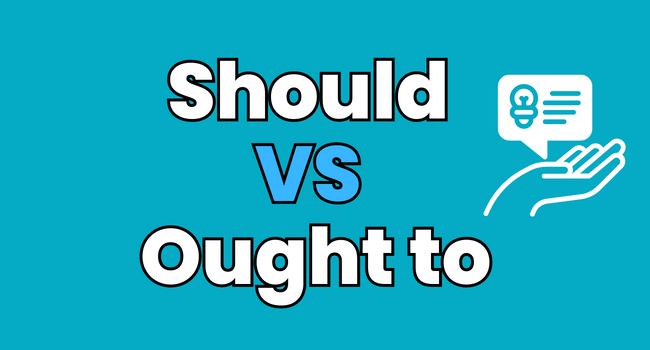
In today’s lesson, we will learn the difference between the usage of “should” and “ought to.” We will also end our lesson with a quiz to test your understanding.
The Difference between “Should” and “Ought To”:
“Should” and “ought to” are both used to give advice or express expectations. “Should” is commonly used in everyday language, while “ought to” is more formal.
Examples:
- You should talk to your doctor about that.
- You ought to talk to your doctor about that.
Both of these sentences are grammatically correct. In general, “should” and “ought to” can be used interchangeably.
Usage of “Should”:
“Should” is used for suggestions, opinions, and advice.
It is a modal verb followed by an infinitive without “to.”
Examples:
- We should go to the cinema tonight.
- Mary should take piano lessons.
- I think you should break up with your boyfriend.
Usage of “Ought To”:
“Ought to” expresses recommendations, obligations, or expectations.
It carries a stronger sense of duty or necessity and is more formal.
Examples:
- We ought to respect our elders.
- You ought to study harder if you want to pass the exam.
- Carl ought to apologize to his best friend.
Negative Forms of “Should” and “Ought To”:
“Shouldn’t” is used to advise against something. While “oughtn’t to” is grammatically correct, it is not commonly used.
Examples:
- You shouldn’t drink so much soda.
- You oughtn’t to drink so much soda. (This is correct, but it is uncommon.)
- We shouldn’t stay up too late tonight.
We oughtn’t to stay up too late tonight.
Interrogative Forms of “Should” and “Ought To”:
Questions with “should” are formed by placing them before the subject.
Interrogative forms of “ought to” are less common, and “should” is often used instead.
Examples:
- Should we invite James to the party?
- Ought we to invite James to the party?
- Should Vanessa move to New York?
- Ought Vanessa to move to New York?
Quiz:
Correct the following sentences without changing “should” or “ought to”:
- You should to call your parents more often.
- She ought to study for the exam tomorrow.
- They not should arrive late at the church on Sunday.
- We ought to not forget to bring our passports to the airport.
- You don’t should spend so much time watching TV.
- Ought we to be worried about climate change?
- Should we to order pasta or pizza tonight?
- We ought to take the bus instead of driving.
Find the answers to this quiz by watching the YouTube lesson above!
While they are often used interchangeably, “should” is more commonly used, and “ought to” carries a stronger sense of obligation. You SHOULD watch my full video on YouTube to practice your skills even more!

Leave a Reply